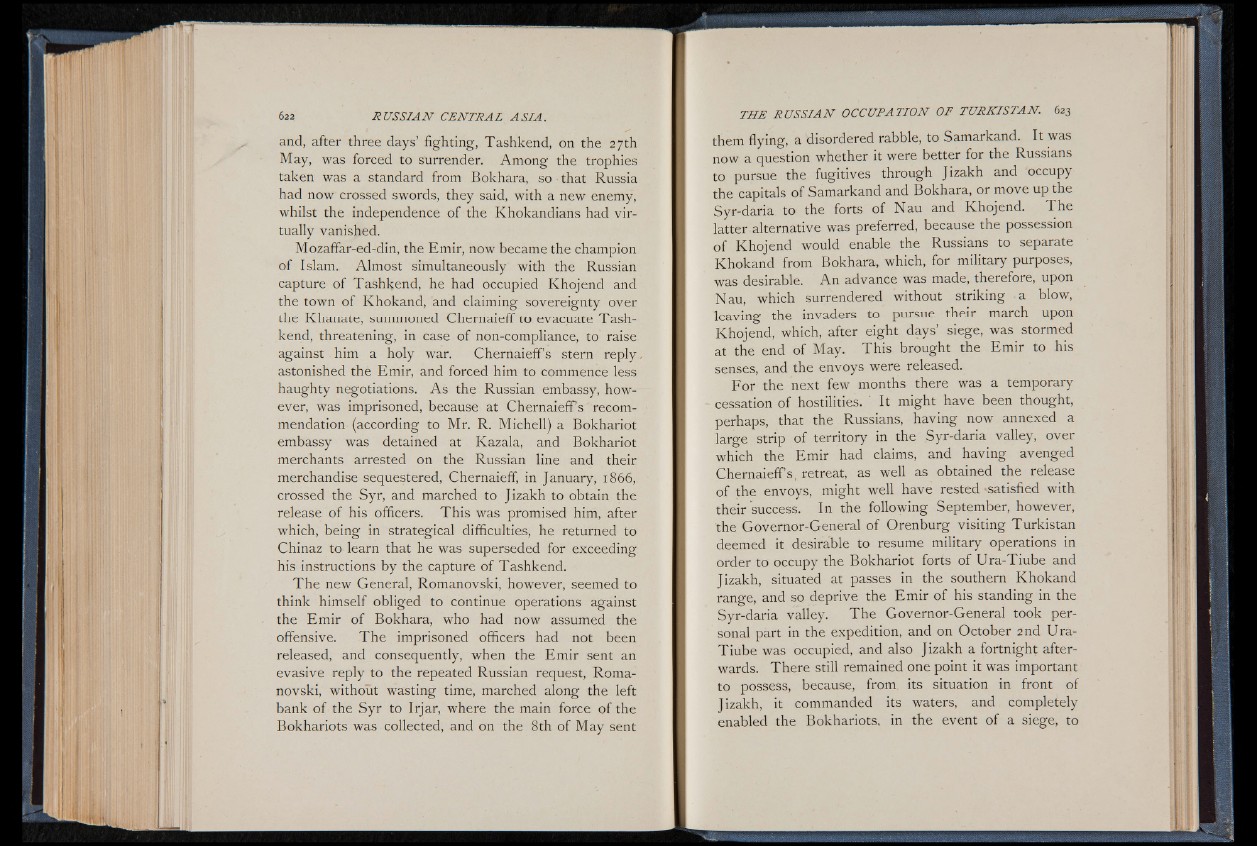
and, after three days’ fighting, Tashkend, on the 27th
May, was forced to surrender. Among the trophies
taken was a standard from Bokhara, so that Russia
had now crossed swords, they said, with a new enemy,
whilst the independence of the Khokandians had virtually
vanished.
Mozaffar-ed-din, the Emir, now became the champion
of Islam. Almost simultaneously with the Russian
capture of Tashkend, he had occupied Khojend and
the town of Khokand, and claiming sovereignty over
the Khanate, summoned Chernaieff to evacuate Tashkend,
threatening, in case of non-compliance, to raise
against him a holy war. Chernaieff’s stern reply,
astonished the Emir, and forced him to commence less
haughty negotiations. As the Russian embassy, however,
was imprisoned, because at Chernaieff’s recommendation
(according to Mr. R. Michell) a Bokhariot
embassy was detained at Kazala, and Bokhariot
merchants arrested on the Russian line and their
merchandise sequestered, Chernaieff, in January, 1866,
crossed the Syr, and marched to Jizakh to obtain the
release of his officers. This was promised him, after
which, being in strategical difficulties, he returned to
Chinaz to learn that he was superseded for exceeding
his instructions by the capture of Tashkend.
The new General, Romanovski, however, seemed to
think himself obliged to continue operations against
the Emir of Bokhara, who had now assumed the
offensive. The imprisoned officers had not been
released, and consequently, when the Emir sent an
evasive reply to the repeated Russian request, Romanovski,
without wasting time, marched along the left
bank of the Syr to Irjar, where the main force of the
Bokhariots was collected, and on the 8th of May sent
them flying, a disordered rabble, to Samarkand. It was
now a question whether it were better for the Russians
to pursue the fugitives through Jizakh and occupy
the capitals of Samarkand and Bokhara, or move up the
Syr-daria to the forts of Nau and Khojend. The
latter alternative was preferred, because the possession
of Khojend would enable the Russians to separate
Khokand from Bokhara, which, for military purposes,
was desirable. An advance was made, therefore, upon
Nau, which surrendered without striking a blow,
leaving the invaders to pursue their march upon
Khojend, which, after eight days’ siege, was stormed
at the end of May. This brought the Emir to his
senses, and the envoys were released.
For the next few months there was a temporary
cessation of hostilities. ' It might have been thought,
perhaps, that the Russians, having now annexed a
large strip of territory in the Syr-daria valley, over
which the Emir had claims, and having avenged
Chernaieff’s. retreat, as well as obtained the release
of the envoys, might well have rested ‘satisfied with
their success. In the following September, however,
the Governor-General of Orenburg visiting Turkistan
deemed it desirable to resume military operations in
order to occupy the Bokhariot forts of Ura-Tiube and
Jizakh, situated at passes in the southern Khokand
range, and so deprive the Emir of his standing in the
Syr-daria valley. The Governor-General took personal
part in the expedition, and on October 2nd Ura-
Tiube was occupied, and also Jizakh a fortnight afterwards.
There still remained one point it was important
to possess, because, from its situation in front of
Jizakh, it commanded its waters, and completely
enabled the Bokhariots, in the event of a siege, to